
A dark, wicked comedy about a man unable to get rid of his dead girlfriend.


A dark, wicked comedy about a man unable to get rid of his dead girlfriend.

It feels like sibling filmmakers are becoming more of a thing lately. In the last two years, movies of all varieties have been made by the Coens (the musically-themed Inside Llewyn Davis), the Wachowskis (big-budget sci-fi Jupiter Ascending), the Farrellys (franchise comedy Dumb and Dumber To), and the Russos (superhero tentpole Captain America: The Winter Soldier). Even a foreign drama is represented by siblings, as evidenced by Ronit and Shlomi Elkabetz’s Gett: The Trial of Viviane Amsalem.
This year, another pair of filmmaking siblings are introduced to the scene: Ben and Chris Blaine, with their first feature film Nina Forever.
Holly (Abigail Hardingham) has a romantic interest in Rob (Cian Barry), her coworker at a local grocery store. Her friends try to warn her away from him, though—he’s been suicidal since the accidental death of his girlfriend more than a year ago. Fate steps in when Rob is injured at work and Holly, who is studying to be a paramedic, offers to examine his wound. There’s a spark between them, and on their first date, that spark becomes a flame when they find their way to Rob’s bedroom. Their heat is quickly cooled, however, by the sudden appearance (in bed next to them, no less) of Rob’s ex-girlfriend—the very dead, very chatty Nina (Fiona O’Shaughnessy).
Nina, whose corpse is still bloodied and broken from the car accident that took her life, becomes a greater presence—and a greater nuisance—in the new couple’s life. As Rob struggles to figure out how to stop Nina’s appearances, Holly considers the opposite approach by embracing the decedent’s presence.
Who are these Blaine Brothers and where have they been hiding? Nina Forever is a sensational film, and while the presence of a talking corpse might tempt some to hang a horror tag on it, don’t take the bait. This is a deliciously dark comedy/psychological drama hybrid, using the horror device of Nina’s corpse as a symbol for guilt and loss, then doubling-down and using her unwillingness to leave Rob and Holly alone as a metaphor for the couple’s inability to properly deal with the loss (It also uses her wit for the funny bits—and there are plenty of those).
The film, co-written by the Blaines, has a strong foundation in the construct of its three lead characters. Rob is so burdened by loss and guilt (he was driving the car in the accident that killed Nina) that he has become mostly non-functioning. Holly is a wannabe paramedic—a healer, a rescuer, a fixer of things—and he is something she can fix. And Nina—poor, dead Nina—might be a symbol for something deeper, but on the surface she’s still the girlfriend who has been jilted, at least by circumstance (her insistence that Rob not refer to her as his “ex-girlfriend” because they never technically broke up is hysterically played).
O’Shaughnessy, Hardingham, and Barry all turn in solid performances, as do David Troughton and Elizabeth Elvin in key supporting turns as Nina’s parents.
As the story progresses, the characters evolve in a way that so many other writers struggle to make happen on the page. There is an organic fluidity to how the trio act, react, and interact throughout the length of the film. Also, Nina’s first reveal could have been treated as some type of singular moment that the rest of the film winds up tethered to until the end. Not so in the Blaines’ hands. That first reveal of Nina truly is the jumping-off point for a longer game with a wickedly smart ending I did not see coming. Sparkling dialogue that any actor would want to deliver tops off a script any director would want to helm.
There is a strong confidence to the Blaines’ direction, too. They are clearly not afraid to take creative chances, and this confidence results in that sweet spot between storytelling and artistry. This is an engaging story that is also great to look at. (Oh, and the fellas know how to film a scorching sex scene, too.) While they get key help from Oliver Russell’s gorgeous cinematography, their secret weapon is their editing. The Blaines join the growing list of filmmakers who edit their own work (a practice I’ve grown to appreciate). There are present-day moments in the film, such as Rob and Holly’s first date, that integrate glimpses from the past and teases from the future to offer a complete picture before the picture has even developed. Not only does that take confidence to attempt, it’s difficult to execute, but the directors make it work.
Nina Forever is the film to follow, and with it, the Blaine Brothers have brought serious game to the screen. It’s clear the film world’s latest sibling tag-team has come to play.
A version of this review was originally published on March 15th, 2015, as part of our coverage of the SXSW film festival.